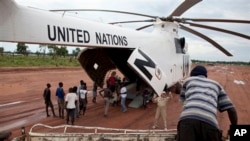UNITED NATIONS —
The United Nations is facing massive funding shortfalls as it tries to feed millions of people in need in Sudan and South Sudan. Without urgently needed funds, people may die.
The head of operations for the U.N.’s humanitarian division, John Ging, said Tuesday that the agency has requested nearly $2.3 billion in funding for humanitarian efforts this year in Sudan, its Darfur region, and South Sudan.
More than two million people are displaced in Darfur, and over six million people need humanitarian assistance across Sudan.
In South Sudan, recent violence has internally displaced some 700,000 people and forced nearly a quarter of a million others to flee to neighboring countries as refugees. The U.N. says almost five million people in South Sudan are in urgent need of basic humanitarian assistance.
Ging told reporters that the appeals are dangerously underfunded.
“In that gap - between what we receive and what we need - are people dying. It is as graphic and as tragic as that," said Ging.
Of the $995-million request for Sudan, only 3 percent - or $34 million - has been received. On South Sudan, only a quarter of the nearly $1.3 billion requested has been funded.
Ging recently traveled to the region with UNICEF’s deputy director of emergency operations, Yasmine Haque, and the emergency directors of several other U.N. agencies and NGO partners.
South Sudan, has less than a thousand kilometers of paved roads. Yasmine Haque stressed that during the rainy season, which will begin in June, dirt roads will become impassable, making up to three-quarters of the country inaccessible.
Normally, aid agencies position supplies during the dry season so they can distribute them during the wet months; but, Haque said that has not been possible this year due to the fighting, access issues and funding constraints.
“This means that not enough food has been prepositioned throughout the country, we don’t have the type of water and sanitation supplies, our nutritional supplements that are so needed to treat the cases of malnutrition, seeds and tools, agricultural implements, whatever is needed to keep a group of people who are in a dire need from slipping further into grave humanitarian consequences is not possible," said Haque.
In addition to insufficient funding, Ging said in South Sudan humanitarian workers face delays at checkpoints, slowing down the delivery of aid to those in need.
In Sudan, meanwhile, there are regions of the country humanitarians have not had access to in several years, including in the rebel-held areas of South Kordofan and Blue Nile states where some 800,000 people are in need. Ging said in Darfur, there has been better access, except in the Jebel Marra area, where they have had no access since 2010.
The head of operations for the U.N.’s humanitarian division, John Ging, said Tuesday that the agency has requested nearly $2.3 billion in funding for humanitarian efforts this year in Sudan, its Darfur region, and South Sudan.
More than two million people are displaced in Darfur, and over six million people need humanitarian assistance across Sudan.
In South Sudan, recent violence has internally displaced some 700,000 people and forced nearly a quarter of a million others to flee to neighboring countries as refugees. The U.N. says almost five million people in South Sudan are in urgent need of basic humanitarian assistance.
Ging told reporters that the appeals are dangerously underfunded.
“In that gap - between what we receive and what we need - are people dying. It is as graphic and as tragic as that," said Ging.
Of the $995-million request for Sudan, only 3 percent - or $34 million - has been received. On South Sudan, only a quarter of the nearly $1.3 billion requested has been funded.
Ging recently traveled to the region with UNICEF’s deputy director of emergency operations, Yasmine Haque, and the emergency directors of several other U.N. agencies and NGO partners.
South Sudan, has less than a thousand kilometers of paved roads. Yasmine Haque stressed that during the rainy season, which will begin in June, dirt roads will become impassable, making up to three-quarters of the country inaccessible.
Normally, aid agencies position supplies during the dry season so they can distribute them during the wet months; but, Haque said that has not been possible this year due to the fighting, access issues and funding constraints.
“This means that not enough food has been prepositioned throughout the country, we don’t have the type of water and sanitation supplies, our nutritional supplements that are so needed to treat the cases of malnutrition, seeds and tools, agricultural implements, whatever is needed to keep a group of people who are in a dire need from slipping further into grave humanitarian consequences is not possible," said Haque.
In addition to insufficient funding, Ging said in South Sudan humanitarian workers face delays at checkpoints, slowing down the delivery of aid to those in need.
In Sudan, meanwhile, there are regions of the country humanitarians have not had access to in several years, including in the rebel-held areas of South Kordofan and Blue Nile states where some 800,000 people are in need. Ging said in Darfur, there has been better access, except in the Jebel Marra area, where they have had no access since 2010.




